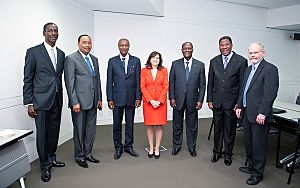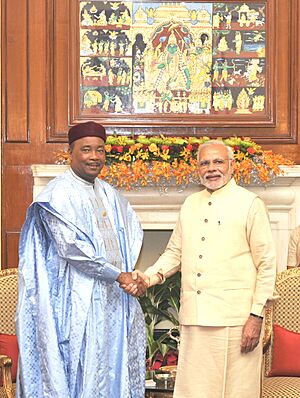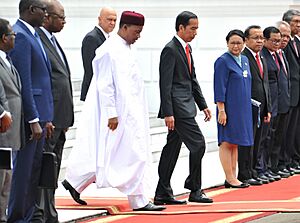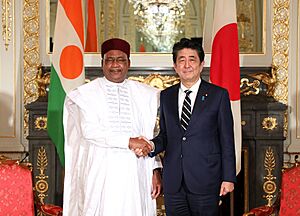Mahamadou Issoufou facts for kids
Quick facts for kids
Mahamadou Issoufou
|
|
|---|---|
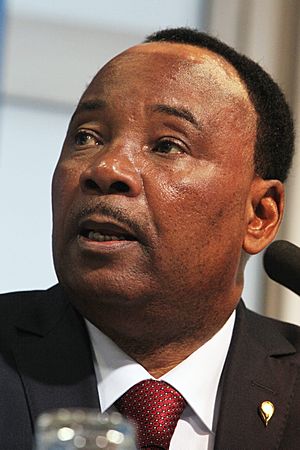
Issoufou in 2012
|
|
| 9th President of Niger | |
| In office 7 April 2011 – 2 April 2021 |
|
| Prime Minister | Brigi Rafini |
| Preceded by | Salou Djibo (Chairman of the Supreme Council for the Restoration of Democracy) |
| Succeeded by | Mohamed Bazoum |
| 5th Prime Minister of Niger | |
| In office 17 April 1993 – 28 September 1994 |
|
| President | Mahamane Ousmane |
| Preceded by | Amadou Cheiffou |
| Succeeded by | Souley Abdoulaye |
| Personal details | |
| Born | 1 January 1952 Dandaji, French West Africa (now Niger) |
| Political party | Nigerien Party for Democracy and Socialism |
| Spouses | Aïssata Issoufou Mahamadou Lalla Malika Issoufou |
| Children | Mariam Kamara Sani Issoufou Mahamadou |
Mahamadou Issoufou (born 1 January 1952) is a politician from Niger. He served as the president of Niger from 2011 to 2021. Before becoming president, Issoufou was the prime minister of Niger from 1993 to 1994. He also led the Nigerien Party for Democracy and Socialism (PNDS-Tarayya), a political party, from its start in 1990 until he became president.
Issoufou left power peacefully in 2021, following the country's rules that limited him to two terms as president. This was the first time power was transferred democratically in Niger. For this, he received the Ibrahim Prize in March 2021, which recognizes good leadership and respect for term limits.
Contents
Early Life and Career
Issoufou was born on 1 January 1952, in a town called Dandaji in Niger. He is from the Hausa ethnic group. He trained as an engineer. From 1980 to 1985, he worked as the National Director of Mines. Later, he became the Secretary-General of the Mining Company of Niger (SOMAIR). He is married to Aïssata Issoufou Mahamadou, who is a chemist, and to Dr. Lalla Malika Issoufou, who is a doctor.
Becoming Prime Minister in 1993
In February 1993, Niger held its first elections where many political parties could take part. Issoufou's party, the PNDS, won 13 seats in the National Assembly. Issoufou himself won a seat representing his home area of Tahoua.
The PNDS joined with other parties to form a group called the Alliance of the Forces of Change (AFC). This group had the most seats in the National Assembly. In the presidential election that same month, Issoufou came in third place. The AFC then supported Mahamane Ousmane, who came in second, for president. Ousmane won the election, and because the AFC had the most power in parliament, Issoufou became Prime Minister on 17 April 1993.
Political Challenges and Changes: 1994–1999
On 28 September 1994, Issoufou resigned as Prime Minister. This happened after President Ousmane made a decision that reduced the Prime Minister's powers. Issoufou's party then left the ruling group. This meant the ruling group no longer had the most seats in parliament, so new elections were called for January 1995.
For the 1995 election, Issoufou's party teamed up with their former rivals, the MNSD. This new team won a small majority of seats. Issoufou was then chosen as the President of the National Assembly. However, this led to a situation where the President and the government were from opposing parties, causing political disagreements.
On 27 January 1996, a military coup took place, and Ibrahim Baré Maïnassara took power. Issoufou, along with President Ousmane and Prime Minister Hama Amadou, was arrested and later placed under house arrest until April 1996.
In the presidential election held in July 1996, Issoufou came in fourth place. He and other opposition candidates were again placed under house arrest for two weeks during the election. After this, he refused to meet with Maïnassara and called for public protests. He was arrested again in January 1997 after a protest.
Leading the Opposition: 1999–2010
In April 1999, Maïnassara was killed in another military coup. New elections were held later that year. In the first round of the presidential election in October, Issoufou came in second. He then lost to Mamadou Tandja in the final round in November. After the results were announced, Issoufou accepted them and congratulated Tandja.
Issoufou was re-elected to the National Assembly in the November 1999 parliamentary election.
In the 2004 presidential election, Issoufou again came in second behind President Tandja. He lost in the final round, but he gained more votes than in the previous election. Issoufou accused Tandja of using government money for his campaign and said the election was not fair.
He was re-elected to the National Assembly in the December 2004 parliamentary election.
Political Challenges in 2009
In 2009, Issoufou's party strongly opposed President Tandja's plan to change the constitution. Tandja wanted to change the rules so he could stay in power for an unlimited time. Issoufou said that Tandja was trying to create a "dictatorship." As the leader of the opposition group, he called for protests against Tandja's plans.
In June 2009, Tandja took special emergency powers. Issoufou accused Tandja of a "coup d'état" and asked the military to ignore his orders. Issoufou was briefly held by the police but was released. A nationwide strike called by the opposition was held and had some success.
The vote on the new constitution happened on 4 August 2009, even though the opposition strongly objected. The new constitution was approved. Issoufou promised that the opposition would "fight against this coup d'etat" by President Tandja.
In September 2009, Issoufou was charged with misusing funds, but he said the charges were for political reasons. He left the country for a short time. In October 2009, he returned to Niger to cooperate with the authorities.
In February 2010, Tandja was removed from power in a military coup. This allowed opposition leaders like Issoufou to return to politics. In November 2010, Issoufou was chosen as his party's candidate for the January 2011 presidential election. Many people thought he was a strong candidate.
Presidency: 2011–2021
Issoufou won the presidential election in March 2011. He became president on 7 April 2011, taking over from Salou Djibo. He then chose Brigi Rafini to be his Prime Minister.
In July 2011, a plan to harm Issoufou was reportedly discovered. Several soldiers were arrested in connection with this.
In November 2015, Issoufou was chosen as his party's candidate for the 2016 presidential election. In February 2016, he won 48% of the votes in the first round. Since no one got more than half the votes, a second round was needed. Many opposition parties decided not to take part in the second round, saying that Issoufou had become too controlling. Issoufou then won the second round with 92.5% of the votes. He was seen as a strong ally of Western countries.
In 2020, he announced that he would not run for a third term in the 2020–21 election.
On 31 March 2021, just before his term ended, his government stopped an attempt by some military officers to prevent his successor, Mohamed Bazoum, from becoming president.
After the Presidency
After President Bazoum was removed from office and detained in a coup in July 2023, Issoufou was involved in talks to try and get him released. In August 2023, he again called for Bazoum to be freed and returned to his position. Issoufou's son, Mahamane Sani Mahamadou, who was Bazoum's oil minister, was among several officials arrested by the new military government after the coup.
Other Activities
- International Crisis Group (ICG), Board of Trustees (since 2023)
Honours
See also
 In Spanish: Mahamadou Issoufu para niños
In Spanish: Mahamadou Issoufu para niños
 | William Lucy |
 | Charles Hayes |
 | Cleveland Robinson |


